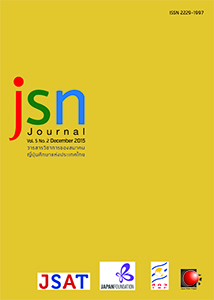ทิศทางการพัฒนาทรัพยากรบุคคลเพื่อ ผู้ประกอบการญี่ปุ่นในไทยในศตวรรษที่ 21
Main Article Content
Abstract
ด้วยความเจริญก้าวหน้าของเทคโนโลยีสารสนเทศทำให้ กระแสของสังคมโลกมีการเปลี่ยนแปลงอย่างรวดเร็ว รูปแบบ การดำเนินชีวิตและการเรียนรู้ของผู้คนในสังคมก็เปลี่ยนไป การ เปลี่ยนแปลงเหล่านี้ก่อให้เกิดการเปลี่ยนแปลงในด้านทักษะที่จำเป็น ในตลาดแรงงานด้วย ญี่ปุ่นมีบทบาทเป็นผู้นำในการพัฒนาเศรษฐกิจ ของประเทศในภูมิภาคเอเชียตะวันออกเฉียงใต้มานานหลายสิบปี และยังคงความสำคัญอยู่จนปัจจุบัน ทำให้ผู้ประกอบการญี่ปุ่นได้รับ การชักชวนให้มาลงทุนอย่างต่อเนื่องโดยเฉพาะในประเทศไทย แต่หนึ่ง ในปัญหาของประเทศไทยที่เป็นอุปสรรคสำคัญ คือการขาดกำลังคน ที่มีคุณภาพ สถาบันการศึกษาจำเป็นต้องเร่งปฏิรูปตนเองเพื่อให้ สามารถผลิตบัณฑิตที่มีคุณภาพตรงกับความต้องการของตลาด แรงงาน บทความนี้มีวัตถุประสงค์เพื่อเสนอแนะว่าควรมีการ ปรับปรุงหลักสูตรให้สอดคล้องกับความต้องการของตลาดแรงงาน ในปัจจุบัน โครงสร้างของบทความนี้มีดังนี้ 1. ภาพรวมการลงทุน ของญี่ปุ่นในไทย 2. ทรัพยากรบุคคลที่บริษัทญี่ปุ่นต้องการ โดย ศึกษาปัญหาด้านการจัดหาบุคลากรของบริษัทญี่ปุ่นในประเทศไทย และภาวะการหางานทำของบัณฑิตสาขาภาษาญี่ปุ่นเป็นกรณีศึกษา 3. ทิศทางการพัฒนาทรัพยากรบุคคล และ 4. สรุปผลและข้อเสนอแนะ เกี่ยวกับแนวทางการพัฒนาการศึกษาเพื่อรองรับการลงทุนจาก ต่างประเทศและตรงกับความต้องการของตลาดแรงงาน
Trends in the HR Development of Japanese Enterprises in Thailand in the 21st Century
Siriwon Munintarawong*
Tasanee Methapisit**
*Dr., Faculty of Liberal Arts, Thammasat University
**Associate Professor, Faculty of Liberal Arts, Thammasat University
The emerging information and communication technologies (ICTs) as well as scientific and technological innovation are advancing very rapidly and are changing the world. These changes are also changing the types of skills needed in the labor market. Japan has been playing a leading role in the development of the economies in Southeast Asia for many decades, and Japan enterprises are continuously persuaded invest in Thailand. However, one of the problems of Thailand is a lack of qualified manpower that can serve the demands of the labor market, and educational institutions need to reform themselves in order to improve the quality their graduates in this regard. This paper suggests that curricula should be redesigned in line with the current demand of the market. The paper is organized as follows. In section 1, we briefly give an overview of Japanese investment in Thailand; in section 2 we discuss the problems of the personnel in Thailand that speak Japanese; in section 3 we explore the trends of manpower resources in Japanese enterprises. In section 4 we summarize the findings and propose a new educational program for foreign investment in Thailand, in order to ascertain the needs of the labor market.
Article Details
ข้อความและข้อคิดเห็นต่างๆ ในบทความเป็นของผู้เขียนบทความนั้นๆ ไม่ใช่ความเห็นของกองบรรณาธิการหรือของวารสาร jsn Journal


